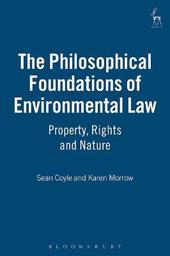
|
The Philosophical Foundations of Environmental Law: Property, Rights and Nature
Hardback
Main Details
| Title |
The Philosophical Foundations of Environmental Law: Property, Rights and Nature
|
| Authors and Contributors |
By (author) Karen Morrow
|
|
By (author) Sean Coyle
|
| Physical Properties |
| Format:Hardback | | Pages:224 | | Dimensions(mm): Height 234,Width 156 |
|
| ISBN/Barcode |
9781841133591
|
| Classifications | Dewey:344.046 |
|---|
| Audience | | Tertiary Education (US: College) | | Professional & Vocational | |
|---|
|
Publishing Details |
| Publisher |
Bloomsbury Publishing PLC
|
| Imprint |
Hart Publishing
|
| Publication Date |
22 April 2004 |
| Publication Country |
United Kingdom
|
Description
Legal regulation of the environment is often construed as a collection of legislated responses to the problems of modern living. Treated as such, 'environmental law' refers not to a body of distinctive juristic ideas (such as one might find in contract law or tort) but to a body of black-letter rules out of which a distinct jurisprudence might grow. This book challenges the accepted view by arguing that environmental law must be seen not as a mere instrument of social policy, but as a historical product of surprising antiquity and considerable sophistication. Environmental law, it is argued, is underpinned by a series of tenets concerning the relationship of human beings to the natural world, through the acquisition and use of property. By tracing these ideas to their roots in the political philosophy of the seventeenth century, and their reception into the early law of nuisance, this book seeks to overturn the perception that environmental law's philosophical significance is confined to questions about the extent to which a state should pursue collective well-being and public health through deliberate manipulation and restriction of private property rights. Through a close re-examination of both early and modern statutes and cases, this book concludes that, far from being intelligible in exclusively instrumental terms, environmental law must be understood as the product of sustained reflection upon fundamental moral questions concerning the relationship between property, rights and nature.
Author Biography
Sean Coyle is a Reader in the Faculty of Law at University College London. Karen Morrow is a Senior Lecturer in Law at Leeds University.
Reviews...an interesting approach to the analysis of environmental law, drawing out important connections between the history of property and environmental law. This work is essential to reforming environmental law. Andrew Green Faculty of Law, University of Toronto University of Toronto Law Journal Vol. 57, No. 1, Winter 2007 ...I cannot fault it...it is a coherent whole...their text is supportive of environmental regulation and bolsters it by establishing how it need not conflict with private rights. Arlene Kwasniak Philosophy in Review, Vol 25, No 4 August 05 Coyle and Morrow..give environmental lawyers the tools to inform debates on sustainable development, human rights, and inter-generational equity, by illuminating how historical context and values shape the current debate. Jaela Shockey Saskatchewan Law Review, Vol 68 2005 ...blending of theory and doctrinal development gives the book its inherent intellectual strength and also renders the book very accessible to the reader. Mike Doupe, Lancaster University Law School Journal of Environmental Law October 2005 ...refreshing...original, succinctly argued (a mere 228 pages), and ultimately compelling...It is thus an important book that will stimulate much further discussion Ben Pontin, Senior Lecturer in Law, University of the West of England The Yearbook of European Environmental Law, Vol. 5 September 2005 ...arguments are well-presented and coherent. Chris Himsworth, Professor of Administrative Law, University of Edinburgh The Edinburgh Law Review, Vol. 10, Issue 1 January 2006 ...will aid the practicing lawyer in understanding the development of environmental law in a broader context...the tools to inform debates on sustainable development, human rights, and inter-generational equity... Jaela Shockey Saskatchewan Law Review 2005
|